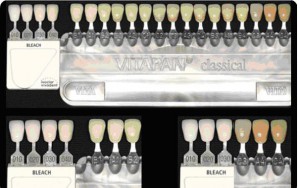Toothpastes, Tooth Whitening, and Marketing
I recently attended a meeting of the International Association for Dental Research, where a major drug company was showing some of its newer products. I will leave the name of the company out, because the concept I am about to address really applies to all of the companies out there.
These meetings are where a great deal of the research going on in Dentistry gets discussed, so they are generally attended by people who are in the research segment of the dental profession, most of which have advanced degrees of some sort. Nevertheless, there is still a fair amount of marketing that is going on, whereby new products are released with a great deal of flair and panache.
In this particular case, the drug company had set up a series of booths that the paraded folks through while pushing their wares, and giving them a few free samples to boot.
These booths are typically staffed by several very young and pretty ladies, who are all very well made up, each of which is wearing a spotless white lab coat.
One of these booths was for a new toothpaste that was formulated to counteract the negative impact that acidic foods could have on your teeth. Being the curious investigator type that I am, I asked the lovely young attendant what would qualify as an acidic food. Her response was a tomato.
I then asked her what the acidity (knows as “Ph”) of a tomato was. She told me she did not know.
It so happened that the very next booth in this parade of products happened to be promoting a dental bleaching agent, so I asked my lovely attendant if she knew what the Ph of that product was. She did not know that either.
I went on to ask her if it was fair to assume that the acidity of the bleaching agent was greater than that of a tomato. To this, she readily agreed.
I then proceeded to point out that to her that it seemed to me that if I didn’t buy the bleaching agent, I would not need to buy the toothpaste she was promoting. This brought on a rather shocked response from her, with a look on her face that was so twisted, I was afraid her make-up would crack.
She quickly grabbed one of her cohorts, which resulted in us repeating the whole conversation, only to get the same answers and final response, at which point the two lovely toothpaste attendants sent me to the next booth over to talk to the equally lovely bleaching product attendants.
Suffice it to say, the bleaching booth was a repeat of the toothpaste booth, with equally befuddled looks, only this time one of the attendants promised to have one of their technical reps call me to answer my questions.
I guess that they could not come up with a good answer for me, because I never heard from the rep.
So what is the point of this discussion? Simply this: There are a number of people out there whose primary function in life is simply to get money out of your pocket. While bleaching your teeth may look nice on the surface, it does nothing good for your overall health, and can damage your teeth in many ways, including creating sensitivity, erosion of enamel, and even decay.
Furthermore, there is a very good reason the good lord did not give you whiter teeth: When you smile, your eyes get bigger, and the whites of your eyes “light up”, drawing the attention of other onlookers to your eyes. Your teeth are supposed to blend with your skin tones (which they almost universally do) so that your face has a nice balanced and pleasant looks through all of your facial expressions (except maybe rage and anger).
If your teeth are too white, what happens when you smile is that the onlooker’s attention is drawn to your teeth instead of your eyes, which is just unnatural. In fact, when I was in dental school, making the teeth look too white was considered a major mistake, known as “Chicklets”. A patient of mine equated it to having a deformity on your face that became more prominent and attention gathering when you smile.
At the very same meeting, I had a discussion with another dentist whose research addressed the side effects of bleaching. When I asked him why he thought bleaching was important, he said: “It makes people feel good!”
When I asked him if we could not make people feel as good just by explaining that their natural tooth color blends with their face, his response was: “Yeah, but we can’t make any money that way!”
Dr. Craig Ajmo, of Mountain Dental Associates in Ellijay, is a Graduate of Emory University School of Dentistry. He is also heavily involved in Practice Based Research, and is a board Member of the Network for Practice Based Research of the International Association for Dental Research.

Bleached teeth are often considerably whiter than what Mother Nature intended, as seen in these shade guides used by dentists. Teeth that are too white can give you an odd look.
Mother Nature intended for your teeth to blend with your skin tones. Examples are shown in the shade guides that Dentists use. Teeth that have been bleached to be too bright can give you an odd look.
